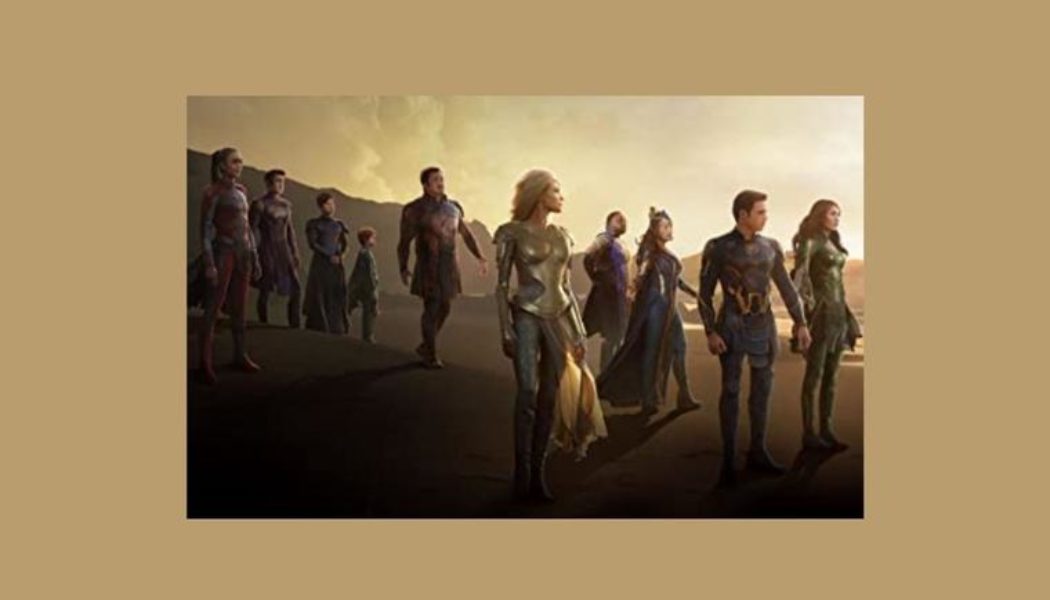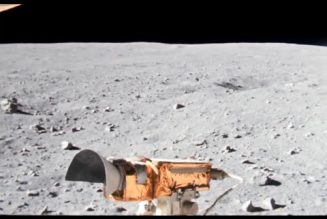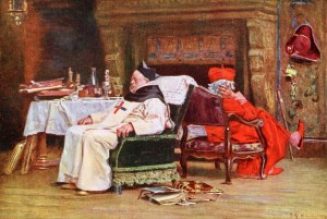
“You cannot go on ‘seeing through’ things forever. The whole point of seeing through something is to see something through it. It is good that the window should be transparent, because the street or garden beyond it is opaque. How if you saw through the garden too? It is no use trying to ‘see through’ first principles. If you see through everything then everything is transparent. But a wholly transparent world is an invisible world. To ‘see through’ all things is the same as not to see.” (C.S. Lewis, The Abolition of Man)
Note: This article contains Eternals spoilers.
One of the most enduring raps on the Marvel Cinematic Universe is its villain problem. After more than a dozen years and some 25 films featuring dozens of superheroes, the MCU has produced just two memorable, enduring antagonists: Tom Hiddleston’s mercurial Loki and Josh Brolin’s emo nihilist Thanos. Not to slight Michael B. Jordan’s incandescent Killmonger, among maybe one or two others who stand out amid a deep bench of forgettable mediocrities like Malekith and Taskmaster — but even the best of the rest have, so far, been one-and-done baddies of the week.
Eternals — a sweeping ensemble origin story spanning thousands of years of human history and introducing a record-breaking 10 new costumed heroes at one go — adds a number of new forgettable antagonists, primarily the mindless monstrosities called Deviants. At least one of the non-Deviant antagonists is officially a spoiler, but you’ll probably spot the other one out of the gate if you’ve been paying attention. He’s a culmination of an archetype running through Marvel movies from the beginning: an apotheosis of the MCU’s most consistent idea, if not their only idea.
This archetype can be broadly called “The Man” or “the Powers that Be.” Always a powerful, patriarchal establishment figure, like Obadiah Stane, Nick Fury or Alexander Pierce (Robert Redford’s character in Captain America: The Winter Soldier), The Man is often the protagonist’s actual father, like Howard Stark or Black Panther’s father T’Chaka. Sometimes Dad is a literal higher power, a being of quasi-divine status, like Odin of Asgard, Ego the Celestial (father of Star-Lord), or the immortal Wenwu (father of Shang-Chi). In The Eternals, The Man is something more exalted still — and this has unavoidable existential and dramatic consequences.
Incarnations of The Man vary from one MCU movie to another in terms of how sympathetic or compromised he is. Always, though, The Man has damaging secrets, misrepresents his true intentions, and can’t be trusted, at least not completely. Even if The Man himself is more sympathetic than not, the institution, legacy, program or domain he represents is fundamentally compromised or corrupt.
“Let’s just say the greater good has rarely outweighed my own self-interest,” Howard Stark himself eventually admitted to Tony in a poignant, time-bending final encounter. Howard left his son a legacy of war profiteering, and the way he dispatched his unscrupulous colleague Anton Venko — who helped invent Stark Industries’ greatest nonviolent achievement, the arc reactor — was ruthless at best, and had grave consequences for both men’s sons, especially Venko’s. Taking this tainted legacy to a new level, Tony’s surrogate father figure Obadiah Stane sold weapons to terrorists.
Behind Nick Fury’s dissembling about S.H.I.E.L.D.’s super-weapons program, among other things, may have been humane motives, but S.H.I.E.L.D. itself was secretly rotten from within, infiltrated and subverted by Hydra, a terrorist secret society with Nazi ties. Odin and T’Chaka were largely depicted as benevolent rulers, but their regimes papered over their leaders’ unacknowledged crimes: Odin’s campaigns of genocide and murderous conquest; T’Chaka’s cover-up of the killing of his radicalized brother N’Jobu and the abandonment of N’Jobu’s young son, the future Killmonger. (Wakanda’s historic isolationism in the face of African suffering and turmoil is a further stain on its legacy.)
These are storytelling choices with moral and thematic potential. The Winter Soldier’s “Who watches the watchmen?” theme — unaccountable government agencies amassing too much power over the lives of citizens — evokes real-world political concerns such as the excesses of the Patriot Act. Revelations of Asgard’s shameful founding have topical resonance in our day, with civil and ecclesiastical authorities being called to account for their complicity in what have been called genocidal acts against Indigenous Americans. (I consider Thor: Ragnarok morally vacuous storytelling, but not because of its anticolonial vibe.)
The potential moral heft of such stories depends on the reality that the misdeeds of establishment figures, potentates and even godlike beings can be judged by higher standards. All fathers have obligations to their children. Corporate bosses are bound by the law; even kings are not above international law. Odin explicitly acknowledges in Thor: The Dark World that the Asgardians are “not gods.” Star-Lord’s dying mother declared his father to be “an angel composed of pure light,” but the Celestial Ego smilingly accepts the designation of god with a “small g — at least when I’m feeling humble.”
In Eternals, we learn more about the beings called Celestials. Opening titles directly reference Genesis 1, starting with “In the beginning…” Before the “the dawn of creation,” this Marvel creation myth continues, “came the Celestials.” The “Prime Celestial,” whom we will come to know as Arishem, brought “light to the universe.” Among his other worlds and works, Arishem created the Earth and human beings. Then, following the initially unexplained appearance of the Deviants, described as “an unnatural species of predators,” Arishem created the Eternals — the first superheroes — to “restore order.”
In this seemingly dualistic mythos, Arishem is something a lot like God, and the Eternals and the Deviants are like angels and demons — except that the Deviants, instead of being fallen Eternals, apparently appeared out of nowhere, and the Eternals were Arishem’s response plan. (Comics legend Jack Kirby, who created the Celestials and the Eternals, was Jewish, and it may not be a coincidence that the name Arishem is vaguely suggestive of Hashem, a Hebrew circumlocution for God literally meaning “the Name.” That said, Kirby’s “Arishem the Judge” in the comics isn’t nearly the primal creator-figure that the movie’s Arishem is. More obviously, the Jewish prayer called the Shema, from the Hebrew word meaning “hear” or “listen,” is echoed in the name of another Celestial, Ashema the Listener.)
The Eternals, we are told, follow Arishem’s will with unswerving faith — which is, of course, another way of saying that, by the end, that faith will be at least shaken, if not shattered. That’s what happens when you trust The Man.
When the stakes are this high, questioning The Man also means cross-examining the Grand Design — a motif previously seen on the small screen in the Disney+ series Loki. Loki opened with the premise that the integrity of spacetime is monitored and regulated by a bureaucratic organization called the Time Variance Authority, or TVA. TVA agents see themselves as protecting “the sacred timeline,” a quasi-religious trust prescribed by supposedly divine beings called the Time-Keepers.
All of this is ultimately revealed to be a lie: The Time-Keepers are only figurehead androids, and no timeline is any more “sacred” than any other. The mastermind behind the lie, a mortal called He Who Remains, is merely a survivor of a temporal war between alternate realities and has taken to pruning variant timelines in order to preserve temporal peace. (At the end of the last episode, He Who Remains is killed, triggering an explosive temporal multifurcation and presumably threatening new temporal wars.)
The Grand Design, as the Eternals understand it, calls for them to combat the Deviants, allowing humanity to thrive — or to engage in war, conquest and genocide; the Eternals, like the Federation with their Prime Directive in Star Trek, are not to interfere in the affairs of primitive beings. It’s a rule that, much like Captain Kirk, the Eternals don’t entirely follow, from their arrival in Mesopotamia circa 5,000 B.C. to the rise of the Babylonian empire to the slaughter of Aztecs at Tenochtitlán by Cortés.
Finally, Arishem’s dark secrets are revealed: First, it turns out the Deviants, too, were created by the Celestials, with the intention that they should help intelligent life develop by eliminating dangerous predators — but when they became out-of-control predators themselves, the Eternals were created as damage control. It also turns out that the Eternals are not living organisms, but machines with false memories that are routinely reset for each new assignment.
But the big twist is that the Celestials aren’t altruistically interested in intelligent life for its own sake. They create and foster inhabited worlds like the Earth as a means of … growing new Celestials. Such a planet is essentially a giant egg with an embryonic Celestial at its core — and what incubates it is the collective life-force of intelligent species like ours. So when the intelligent population of a world reaches a given level, there’s an apocalyptic hatching event, and the shattered, dead world is left behind. And, naturally, the time is now.
Bracket, for a moment at least, the absurd, incipiently Malthusian resonances of this conceit. (This is a movie that proposes that global warming comes from the planet’s core, due to the quickening of Celestial life; it’s not a movie with a coherent environmental outlook.) Consider, instead, how the Eternals (or most of them) react to these revelations: Realizing that their whole worldview was a lie and that the humans they have come to care about and admire are doomed, they contemplate an audacious plan to abort the hatching Celestial in order to save the Earth and humanity. (Bracket, too, the question of a Celestial abortion to save all life on mother Earth — and, while we’re at it, the hero in a same-sex relationship and the same-sex kiss.)
The moral implications of the Eternals’ conundrum are considered from a number of angles. For one thing, just as every chicken hatched means more eggs, so more Celestials means more Earth-like worlds — so if the Earth is saved, how many inhabited worlds that might have existed will never be? No one asks why we should care about such worlds, which are also destined to be snuffed out once they become populous enough.
More fundamentally, the business of hatching new Celestials is what the whole system — the Earth, human beings and the Eternals — was created for, what it is designed to do. The Eternals are literally machines designed to fight Deviants. The Earth, and terrestrial life, are a more complicated sort of machine. This includes human beings, who were fashioned by their creator, not in his image or out of love, but as expendable parts of a planetary hatchery.
Who is anyone, human or Eternal, to call this system wrong or unjust? By what standard? “Will what is molded say to its molder, ‘Why have you made me thus?’” (Romans 9:20). Decades of science fiction have conditioned us to assume that an entity, even a machine like Data on Star Trek: The Next Generation, that has self-awareness must be recognized as having moral dignity and personal worth. But this assumes that personhood itself has dignity and value — an assumption Arishem evidently doesn’t share. What rights can we have that he is obliged to recognize? What law or value system binds him?
“I respect your grand design,” Ajak (Salma Hayek), leader of the Eternals, ventures to say to Arishem before adding that there’s “something special about this planet.” Arishem, though, warns her not to become attached to humans. Later Sersi (Gemma Chan) remarks, if I recall correctly, that the reversal of Thanos’ genocidal snap erasing half of all beings in the universe (Avengers: Endgame) attests the specialness of Earth. Who decides that such “specialness” matters? In the end, Arishem shows up to announce that he will evaluate his rebel Eternals’ actions by judging humanity to see if they deserve to live. What criteria apply?
Arishem may not quite be the God of classical theism, but Eternals implicitly leans into the conceit that Arishem is the reality behind the Abrahamic conception of God. (Who was it that brought light into the universe “in the beginning”?) The Eternals, after all, include heroes who are held to be the basis of gods and heroes of ancient mythology: Gilgamesh (Don Lee), whose namesake is the hero of the Mesopotamian Epic of Gilgamesh; Thena (Angelina Jolie), i.e., Athena, Greek goddess of wisdom and war; Sersi or Circe; Ikaris or Icarus (Richard Madden); etc. (Curiously, the embryonic Celestial is called Tiamut, though if there’s an explanation as to how the ancient Babylonians came to name their primordial sea-goddess Tiamat, I missed it.)
Reinforcing the idea of Arishem as the God of the Bible, iconography accompanying the closing titles identifies the Eternals with other legendary and religious figures — including St. Michael the Archangel. This kind of crass deconstruction of Christian belief is a striking departure for Marvel, which until now has been careful to demythologize its own heritage to avoid religious complications. (For example, Doctor Strange explained sorcery as a technique analogous to computer programming.) DC’s Wonder Woman suggested that Zeus (not the God of Abraham) created mankind in his image, a move that struck me as notably different from the cautious Marvel approach. That caution is not in evidence in Eternals.
C.S. Lewis, in The Abolition of Man, cites an old joke about a man who, learning that a new stove would cut his fuel bill in half, concludes that with two such stoves he can heat his house with no fuel at all. There are things that can be done by halves, but not by wholes. There is plenty to criticize in Eternals — and some things that I might praise, in another story set in another universe — but I’m not sure any story set in this universe could possibly offer anything to care about one way or the other.
Caveat Spectator: Comic-book action violence; a suicide; scenes of warfare; a brief, non-explicit sex scene; a same-sex kiss and a depiction of a same-sex “marriage”; limited profanity, cursing and crude language. Older teens and up.
Join Our Telegram Group : Salvation & Prosperity








